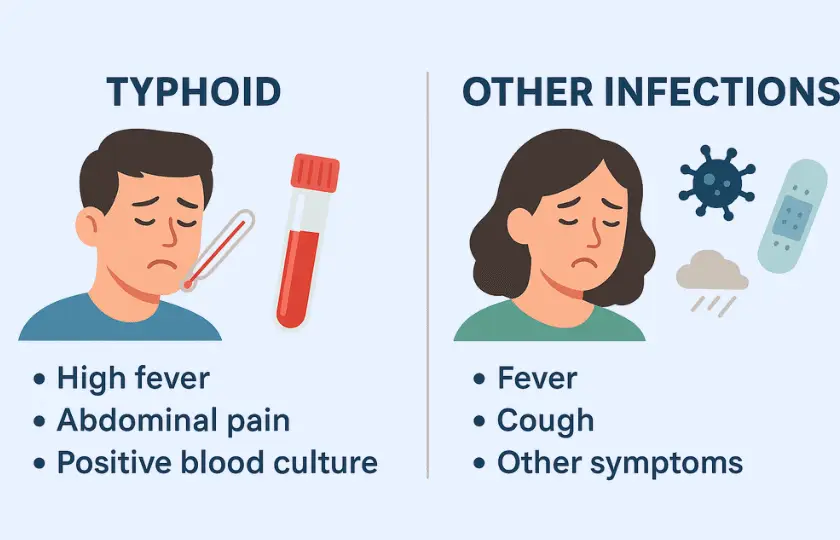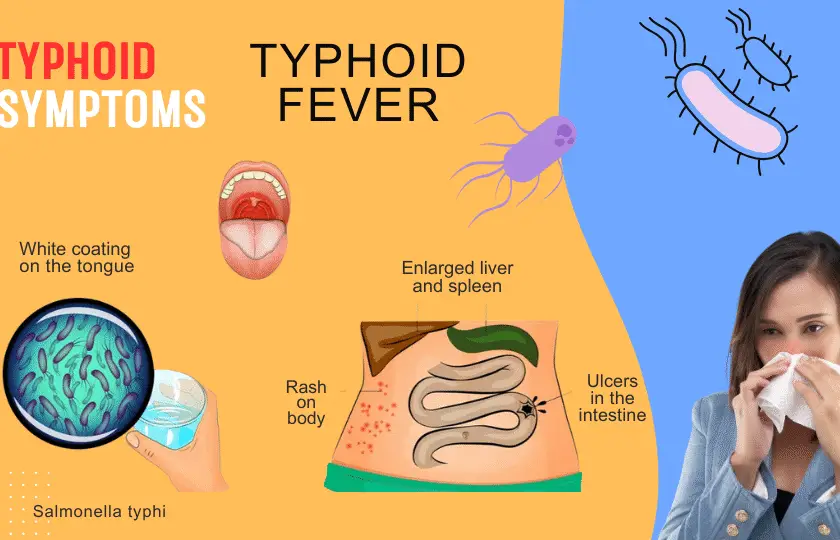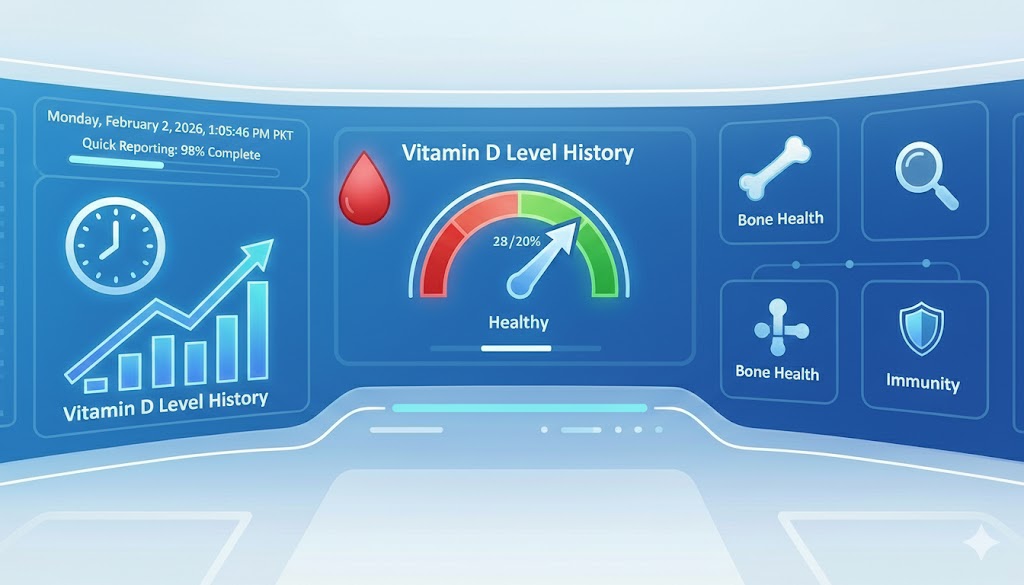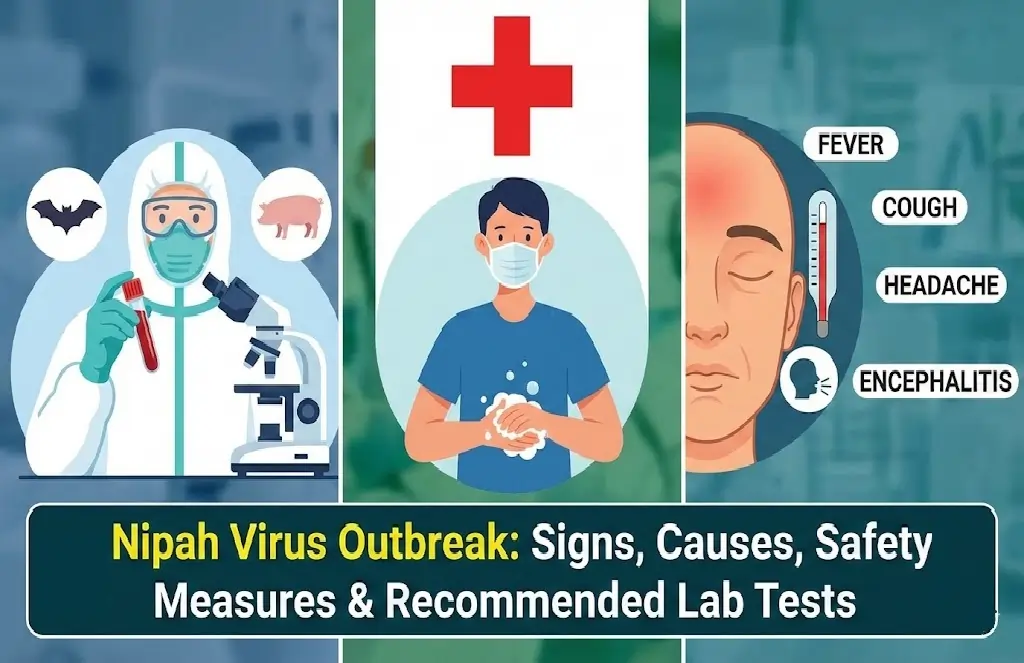Typhoid fever is a serious bacterial infection caused by Salmonella Typhi. It spreads through contaminated food or water and is a major health concern in many developing countries, including Pakistan. Recognizing the early symptoms of typhoid and getting the right medical tests on time is crucial for proper treatment and recovery.
In this article, we’ll discuss:
- Common symptoms of typhoid (early & advanced)
- How to differentiate typhoid from other illnesses
- Recommended diagnostic tests for typhoid (with a quick table)
- Why timely testing and treatment is important
What Are the Symptoms of Typhoid?
The symptoms of typhoid fever usually appear 1–3 weeks after exposure to the bacteria. They can range from mild to severe depending on the stage of infection.
Early Symptoms of Typhoid (First Stage)
The initial signs are often similar to flu or viral infections, which is why many people ignore them:
- Persistent fever (often rising gradually each day)
- Weakness and fatigue
- Headache
- Abdominal pain
- Loss of appetite
- Mild cough
Quick Tip: If your fever persists for more than 3–4 days and does not respond to common medicines, you should consult a doctor immediately.
Advanced Symptoms of Typhoid (If Untreated)
If typhoid is not diagnosed early, symptoms become more severe:
- High fever (104°F or above)
- Severe abdominal pain
- Diarrhea or constipation
- Enlarged spleen and liver
- Skin rashes (rose spots on the chest and abdomen)
- Confusion or delirium in severe cases
How to Differentiate Typhoid from Other Infections?

Typhoid is often confused with malaria, dengue, or flu due to overlapping symptoms like fever and weakness. However:
- Dengue: Usually causes high fever with severe body pain and low platelet count.
- Malaria: Characterized by fever with chills and sweating at regular intervals.
- Flu/Viral fever: Often resolves in 3–4 days without severe abdominal issues.
- Typhoid: Shows a gradual rise in fever, abdominal discomfort, and positive results in blood tests.
Therefore, diagnostic testing is the only reliable way to confirm typhoid.
Essential Tests for Typhoid Diagnosis
Doctors usually recommend specific blood and stool tests to confirm the presence of Salmonella Typhi. Here’s a featured snippet-friendly table for clarity:
| Test Name | Purpose | When It’s Done |
|---|---|---|
| Widal Test | Detects antibodies against Salmonella Typhi | Usually after 7 days of fever |
| Typhidot Test | Identifies IgM/IgG antibodies | Useful for early detection (within 2–3 days) |
| Blood Culture | Gold standard test; confirms bacteria in blood | Best within first week of fever |
| Stool Culture | Detects bacteria in stool samples | Helpful in later stages |
| CBC (Complete Blood Count) | Checks overall infection and white blood cell count | Initial screening test |
Best Practice: A combination of Blood Culture + Typhidot gives the most accurate diagnosis in early stages.
Why Early Diagnosis of Typhoid is Important
If typhoid is not treated quickly with the right antibiotics, it can cause:
- Intestinal bleeding
- Perforation (a life-threatening condition)
- Long recovery period
- Risk of spreading infection to family and community
Early detection not only ensures faster recovery but also helps prevent complications and transmission.
Tips to Prevent Typhoid Infection
While symptoms and tests are important, prevention is always better than cure. Here’s how you can reduce your risk:
- Drink clean, filtered, or boiled water.
- Wash hands properly before meals.
- Avoid eating uncooked or roadside food.
- Get vaccinated if living in or traveling to high-risk areas.
- Ensure proper hygiene in food handling.
Conclusion
The symptoms of typhoid often mimic common viral fevers, but prolonged fever, abdominal pain, and fatigue should never be ignored. If you experience these signs, consult a doctor and get tested immediately.
Essential tests like Widal, Typhidot, Blood Culture, and CBC play a vital role in accurate diagnosis. With timely testing and treatment, typhoid can be completely cured without long-term complications.
If you suspect typhoid, book your test today at a trusted diagnostic center for early and reliable results.
FAQs About Typhoid
1. Is typhoid contagious?
Yes, typhoid is contagious. It spreads through contaminated food, water, or direct contact with an infected person’s stool or urine.
2. How long does typhoid fever last?
If treated properly with antibiotics, typhoid usually lasts 7–14 days. Without treatment, it can last several weeks and lead to serious complications.
3. Can typhoid come back after treatment?
Yes, in some cases, typhoid can relapse within 1–3 weeks after recovery. Regular follow-up tests are recommended.
4. What is the first test for typhoid?
A blood culture is the most reliable early test, but doctors may also suggest Typhidot or Widal tests depending on the stage of illness.
5. How can I prevent typhoid?
Drink clean water, wash hands frequently, avoid unhygienic street food, and consider vaccination if you live in or travel to high-risk areas.









